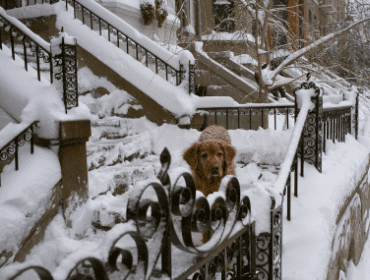Chicago’s Extreme Cold Can Be Dangerous For Pets

Each winter, Chicago experiences periods of extreme cold. Sub-freezing temperatures and below can mean extreme danger for people and pets in our West Loop community. Our West Loop Veterinary Care team answers some common questions regarding pets and the cold weather dangers.
What are some of the dangers to pets during the bitterly cold weather?
Animals, like people, can suffer serious health problems during extreme cold, including frostbite, hypothermia, and even death. This is especially true for our pets, who spend much of their time indoors and are not acclimated to this extreme cold. Extreme cold can be especially tough on puppies, older dogs, and health-compromised dogs.

What can pet owners do to protect their pets?
- Cats should be kept indoors.
- Dog owners should limit their dog’s time outdoors – allowing them outside just long enough to urinate and defecate. Once they have completed what they need to do, bring them inside. Save long dog park visits and outdoor exercise for when temperatures are above freezing.
- Don’t leave your dog unattended outside or in the car.
- Use boots and sweaters or coats for your dogs, especially for:
- Puppies,
- Older dogs
- Health compromised dogs
- Small dogs
- Short-hair dogs
Since dogs have a fur coat, doesn’t that keep them warm in the cold?
- Some dogs with thick, heavy coats such as Siberian Huskies, Alaskan Eskimo Dogs, and Tibetan Mastiffs, are more suited to this weather than other dogs. But even they are at risk for frostbite if left outdoors in the extreme cold for too long.
- Most of our dogs, even those bred for outdoors, spend much of their time inside, so they are not acclimated to the cold weather.
- Frostbite and hypothermia are serious health problems that can quickly set in when the temperature dips to the single digits. Dogs are especially susceptible to frostbite on their ears, tail, and toes.
How long is it safe to leave pets outdoors?
Dr. David Gonsky, Founder and Medical Director of West Loop Veterinary Care says that a good rule to follow is, “If you’re cold, your dog is cold”. That theory can help you gauge how long of a walk to take or how long to be in an outdoor space with your dog.
- Cats should be kept indoors for their safety.
- The tolerance for cold varies by individual dog, its size, coat condition, age, and general health. But it’s fair to say that all dogs are in danger once the temperatures fall below freezing and the danger is extreme when the temperatures are in the teens or below.
- Frostbite can set in within minutes, damaging the animal’s ears, tail, and toes.
How does someone know if a dog is suffering from frostbite?
- The affected area will initially be white and very cold. As it warms, it will become red, may swell and the skin may peel.
- If you think your dog is suffering from frostbite, apply a warm, not hot, towel to the area. Do NOT rub the skin as you can cause further damage. Then contact West Loop Veterinary Care or a veterinary emergency center.
Are there other dangers for pets?
Other dangers for animals this time of the year include anti-freeze – which is extremely toxic, and ice melt, which can cause upset stomach, irritation, and burns.
- Don’t allow your dog to drink from puddles that can contain ice-melting chemicals or anti-freeze, both of which are extremely dangerous to pets.
- Anti-freeze can leak from cars and be found in puddles or snow on the street or curbside. It is usually bright orange, green, blue, or red. If your pet consumes any amount of anti-freeze consider the situation dire. Contact your primary care veterinarian or a veterinary emergency center immediately. Consumption of anti-freeze can lead to serious health problems and death. As is generally true with any pet emergency, prompt care can help lead to better outcomes and lower costs.
- Ice melt can burn your dog’s paws. That’s why boots are good if you are walking your dog on sidewalks and streets where ice melt has been used. If you don’t use boots, it’s always wise to wipe your dog’s paws with a damp cloth when they return indoors after being outside. This will help remove ice and ice melt and reduce the risk of irritation as well as prevent stomach upset from your dog licking it off their feet.
- Outdoor animals may seek warmth under the hood of your car. Make sure to tap on the hood or honk your horn before starting your car on especially cold days.
Dogs don’t seem to like having boots on their feet. What can pet owners do to get their dogs to wear the boots?
Not all dogs will wear boots, but it is probably worth trying to get your dog accustomed to them. This is especially true for our West Loop dogs who often walk on sidewalks that have been treated with ice melt.
- Slowly introduce your dog to boots. One way to do so is to first try them out in your home. Put one boot on and leave it on for a few minutes. Do that a few times during the course of the day until your dog gets accustomed to wearing the boot.
- The next time, try two boots and repeat the process until your dog is comfortable wearing all four boots.
- Some dogs may never accept boots. For those dogs, be sure to wipe their feet with a damp cloth each time they return from a walk.
Any other advice for pet owners?
- Make sure your pets have a warm place to sleep; healthy, nutritious food; and fresh, clean drinking water.
- Provide adequate mental and physical stimulation for your pets each day. This is especially important for dogs on days they can’t go outside. Games of fetch, puzzles, Kong-type toys filled with healthy treats are all engaging activities. Even a cardboard box or a towel rolled up with treats inside it can provide mental stimulation for your dog or cat.
- Weigh your pets regularly. Too often pets whose activities decrease in the winter months, gain weight. Overweight pets can develop a variety of illnesses, so be sure to maintain a healthy weight. Your West Loop Veterinary Care team can help you identify a proper weight and diet for your pet if you need guidance.
What about other animals?
All animals suffer during this weather, including wildlife and birds. Many people provide birdseed this time of the year. If you have a bird feeder, be sure to keep it consistently filled. The birds, and likely the squirrels, will appreciate it.
Your Partner In the Care of Your Pets
Our West Loop Veterinary Care team is here to partner with you in the care of your pets. Since our founding in 2009, our philosophy has always been to provide exceptional care for pets and excellent service to the people who love them. We are committed to educating the public on proper pet care and working with pet owners to make certain their pets live healthy, active, fulfilled lives. As you and your pet face the challenges of winter in Chicago’s West Loop, West Loop Veterinary Care is a resource for information and your partner in the care of your pet. Please give us a call at 312-421-2275 or an email at info@westloopvet.com if you have any questions we can address.
West Loop:
(312) 421-2275
Streeterville:
(312) 766-5959
